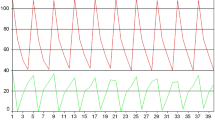Abstract
In this paper, we use The Monks Story, a famous traditional Chinese proverb, as an example to illustrate the practicality of our model on the matters in reality. The Monks Story is typically used in literature that is related to marketing, human resource, and management aspects. However, in our paper, we look at the Monks Story from a different perspective: we assume that the number of players does not change over time and examine how players’ behaviors evolve over time. Our analysis of this story is focused on how individual player as a dual-self individual makes decisions when interacting with other players. We analyze the story and compare the results under three scenarios: history-independent strategy case, history-dependent strategy case and dual-self approach.
Similar content being viewed by others
References
Ashraf, N., Camerer, C., and Loewenstein, G., Adam Smith, Behavioral Economist, J. Econom. Persp., 2005, vol. 19, no. 3, pp. 131–145.
Benhabib, J. and Bisin, A., Modeling Internal Commitment Mechanisms and Self-Control: A Neuroeconomics Approach to Consumption-Saving Decisions, Games Econom. Behav., 2004, vol. 52, no. 2, pp. 460–492.
Bernheim, B.D. and Rangel, A., Addiction and Cue-Triggered Decision Processes, Am. Econom. Rev., 2004, vol. 94, no. 5, pp. 1558–1590.
Bénabou, R. and Pycia, M., Dynamic Inconsistency and Self-Control: A Planner-Doer Interpretation, Econom. Lett., 2002, vol. 77, no. 3, pp. 419–424.
Camerer, C., Loewenstein, G., and Prelic, D., Neuroeconomics: Why Economics Needs Brains, Scand. J. Econom., 2004, vol. 106, no. 3, pp. 555–579.
Chatterjee, K. and Krishna, R.V., A “Dual Self” Representation for Stochastic Temptation, Am. Econom. J.: Microeconomics, 2009, vols. 1–2, pp. 148–167.
DellaVigna, S. and Malmendier, U., Contract Design and Self-Control: Theory and Evidence, Quart. J. Econom., 2004, vol. 119, no. 2, pp. 353–402.
Dekel, E., Fudenberg, D., and Levine, D.K., Learning to Play Bayesian Games, Games Econom. Behav., 2004, vol. 46, no. 2, pp. 282–303.
Derel, E., Lipman, B.L., and Rustichini, A., Temptation-Driven Preferences, Rev. Econom. Stud. Limited, 2009, vol. 76, pp. 937–971.
Fudenberg, D. and Levine, D.K., The Theory of Learning in Games, Cambridge: MIT Press, 1998.
Fudenberg, D. and Levine, D.K., A Dual-Self Model of Impulse Control, Am. Econom. Rev., 2006, vol. 96, no. 5, pp. 1449–1476.
Fudenberg, D. and Levine, D.K., Risk, Delay, and Convex Self-Control Costs, Am. Econom. J.: Microeconomics, 2011, vol. 3, no. 3, pp. 34–68.
Fudenberg, D. and Levine, D.K., Timing and Self-Control, Econometrica, 2012, vol. 80, no. 1, pp. 1–42.
Gul, F. and Pesendorfer, W., Temptation and Self-Control, Econometrica, 2001, vol. 69, no. 6, pp. 1403–1435.
Gul, F. and Pesendorfer, W., Self-Control and the Theory of Consumption, Econometrica, 2004, vol. 72, no. 1, pp. 119–158.
Loewenstein, G., Emotions in Economic Theory and Economic Behavior, Am. Econom. Rev., 2000, vol. 90, no. 2, p. 428.
Loewenstein, G. and O’Donoghue, T., Animal Spirits: Affective and Deliberative Processes in Economic Behavior, CAE Working Paper #04-14, 2004.
Shefrin, H.M. and Thaler, R.H., An Economic Theory of Self-Control, J. Polit. Economy, 1981, vol. 89, no. 2, pp. 392–406.
Wang, W. and Zheng, J., Multi-Period Complete-Information Games with Self-Control: A Dual-Self Approach, Operat. Res. Trans., 2012, vol. 16, no. 4, pp. 95–104.
Wang, W. and Zheng, J., Games with Dual-Self Players, Working Paper, 2012.
Author information
Authors and Affiliations
Corresponding author
Additional information
Original Russian Text © W. Wang, J. Zheng, 2014, published in Matematicheskaya Teoriya Igr i Priloszheniya, 2014, No. 4, pp. 97–115.
Rights and permissions
About this article
Cite this article
Wang, W., Zheng, J. Infinitely repeated games with self-control: A dual-self interpretation of the Monks Story. Autom Remote Control 76, 521–534 (2015). https://doi.org/10.1134/S0005117915030169
Received:
Published:
Issue Date:
DOI: https://doi.org/10.1134/S0005117915030169




